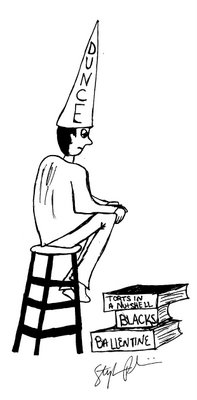Week Four, Part 5 - Legal Research: Don’t Know Anything
 Legal Research, a one-credit class, meets every Wednesday at 3:00 p.m. As in the other non-substantive classes, Ethics and Legal Writing, there’s no Socratic method. Yeah!
Legal Research, a one-credit class, meets every Wednesday at 3:00 p.m. As in the other non-substantive classes, Ethics and Legal Writing, there’s no Socratic method. Yeah!Each week we hear a lecture given by a research librarian from Notre Dame’s Kresge Law Library. The subject matter tends to be basic: the hierarchy of federal and state courts, the different types of case reporters, the format of judicial opinions.
Although the first three lectures have been arid, the information is vital, especially for legal neophytes like me. Maybe the pre-law majors already know that “stare decisis stands for the general proposition that ‘like cases should be decided alike,’” but I’ve never heard it before.
What kills about Legal Research, though, are the assignments. We receive one at the end of each class and it’s due the following Monday. The assignments are pass/fail and designed to take two and half hours. I’ve yet to finish one in less than five.
Lucy Payne, one of the research librarians, tells the students, “Assignments can make us go berserk if we let them. Why? Because law school brings out that anal part of us that doesn't want to make any mistakes.”
She’s got me pegged.
Today the lecture is by Assistant Dean Roger Jacobs. He has a full head of white hair, wire rim glasses, and a ready smile. His oft-trumpeted claim to fame is that he served from 1978 to 1985 as the librarian of the United States Supreme Court.
The topic of Jacobs' lecture is “secondary sources,” books and articles which summarize or comment about the law. He shows us how to use these authorities as tools.
“Pay attention to the footnotes," Jacobs says. "They’ll zap you right where you need to go.”
The assistant dean tells us there are six major types of secondary authorities: legal dictionaries, legal encyclopedias, periodicals and indexes, pamphlets, looseleaf services, and Nutshells.
Jacobs holds up a paperback, white on the top, green on the bottom. Torts in a Nutshell reads the cover. “This one’s by Ed Kionka, my buddy at Southern Illinois,” he says. “As a general rule, Nutshells tend to mountain-top. But as a overview, they’re quite popular.”
Jacobs adds, “Even the law clerks at the Supreme Court use ‘em. They’ll check one out and read it that night.”
I could do that, I think.
Jacobs reads my mind. “The difference between them and us is that they remember everything.”
Ouch! I think.
He closes with a library maxim: “Remember, when you don’t know anything, look at secondary sources first.”
“When you don’t know anything...” “You don’t know anything...” “Don’t know anything...” Long after class, the words echo in my head.
* * *

0 Comments:
Post a Comment
<< Home